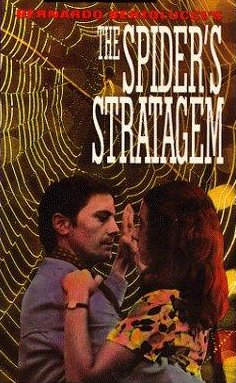The Spider's Stratagem
This article needs additional citations for verification. (May 2020) |
| The Spider's Stratagem | |
|---|---|
 | |
| Genre | Political drama Mystery |
| Based on | Theme of the Traitor and the Hero by Jorge Luis Borges |
| Written by | Bernardo Bertolucci Marilù Parolini Edoardo De Gregorio |
| Directed by | Bernardo Bertolucci |
| Starring | Giulio Brogi Alida Valli |
| Country of origin | Italy |
| Original language | Italian |
| Production | |
| Producer | Giovanni Bertolucci |
| Cinematography | Vittorio Storaro Franco Di Giacomo |
| Editor | Roberto Perpignani |
| Running time | 100 minutes |
| Production companies | RAI Red Film |
| Distributor | RAI |
| Release | |
| Original network | Rai 1 |
| Original release |
|
The Spider's Stratagem (Italian: Strategia del ragno) is a 1970 Italian made-for-television political mystery-drama film written and directed by Bernardo Bertolucci and produced by RAI. The screenplay is based on the 1944 short story Theme of the Traitor and the Hero by Jorge Luis Borges. The film stars Giulio Brogi and Alida Valli, and follows the son of an antifascist martyr who travels to his namesake’s father’s hometown, uncovering secrets of his father’s past in the process.
The film was screened at the 31st Venice International Film Festival before premiering on Rai 1 on October 25, 1970, then rebroadcasting on Rai 2 five days later. It received a limited theatrical release in Europe and the United States.[1]
Plot[]
At the request of his father's mistress, Draifa, Athos Magnani arrives by train in the town of Tara, where his father, also named Athos Magnani, was killed before his birth. The father, remembered as a resistance hero and whom his son greatly resembles, was killed by unknown fascists in 1936—or so says Draifa, the statue in the square, and everyone in the town. Draifa contacted Athos after seeing his picture in a newspaper and expects him to solve or avenge his father's murder. He hears that a few days before his father's death, a fortune teller had predicted his death, as in Macbeth, and on his corpse was an unopened letter warning him not to go ahead, as in Julius Caesar.
His enquiries about his father's death are met with evasion or hostility. Eventually three acquaintances of his father tell him that he planned to blow up Benito Mussolini in the local theatre, during a performance of Rigoletto. The plot failed and his father died after being betrayed to the police. Athos does not believe this tale.
Unsure whether to stay in this claustrophobic town where the truth is never told, he hears the sound of Rigoletto coming from the theatre. Entering, he is told that his father failed to carry out the bombing out of fear, and himself tipped off the police. For this, his fellow conspirators killed him, with his agreement, and ascribed the death to unknown fascists.
At a ceremony in front of his father's statue, Athos starts to tell this story but stops. Whether it was through betrayal or cowardice that his father had become a hero, the town, in his view, needs its myth. Resolving to leave, at the railway station he hears announcements that trains are increasingly late and, looking at the tracks, sees they are rusted and overgrown. He, too, is caught in the web.
Cast[]
- Giulio Brogi as Athos Magnani, father and son
- Alida Valli as Draifa
- Tino Scotti as Costa
- Pippo Campanini as Garibazzi
- Franco Giovannelli as Rasori
- Allen Midgette as Sailor
- Giuseppe Bertolucci as Lion bearer
Production[]
Locations included Sabbioneta for most scenes in Tara. The theater's exterior is Sabbioneta's Palazzo Ducale, and its interior is Fidenza's Teatro Magnani. The square of the hotel is in Pomponesco, with a levee in the background. Draifa's villa is the Villa Longari Ponzoni in Rivarolo del Re ed Uniti. The train station is that of Brescello.[2]
Notes[]
- ^ https://www.sensesofcinema.com/2020/cteq/into-the-web-the-spiders-stratagem-bernardo-bertolucci-1970/.
{{cite web}}: Missing or empty|title=(help) - ^ "Le location esatte di 'Strategia del Ragno'", il Davinotti, December 13, 2010
External links[]
- The Spider's Stratagem at IMDb.
- Allen B. Ruch. "Borges - Film: The Spider's Strategy".
- 1970 television films
- 1970 films
- 1970 drama films
- 1970s mystery films
- Films based on short fiction
- Films directed by Bernardo Bertolucci
- Films set in the 1930s
- Italian independent films
- Italian films
- Italian television films
- Italian-language films
- Political drama films
- Jorge Luis Borges